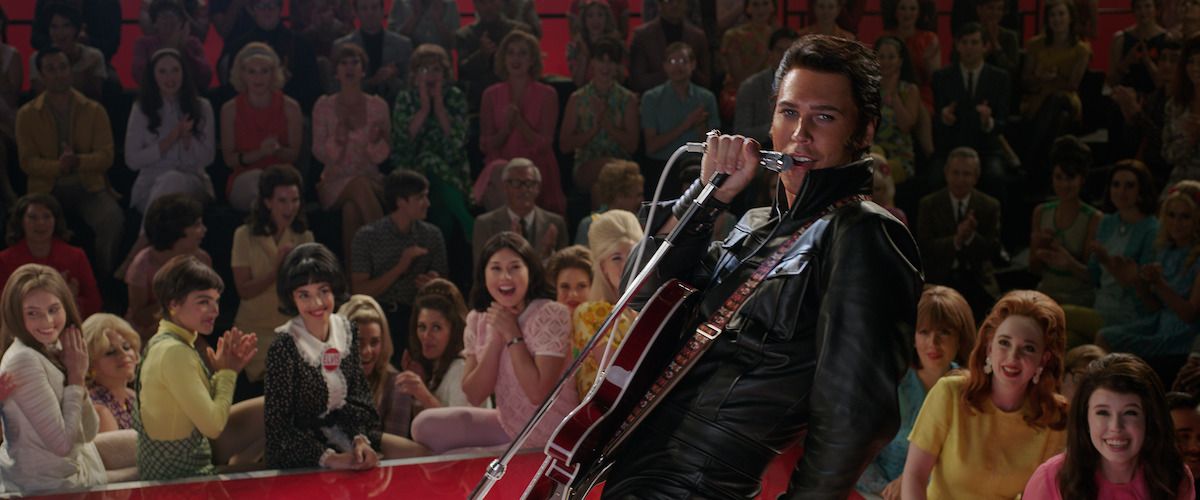By Jonah Naplan
June 24, 2022

Review: Baz Luhrmann brings pathos and heavy flamboyance to Elvis biopic.

By Jonah Naplan
June 24, 2022

“Elvis” is a 159 minute burst of extreme energy, helmed by Baz Luhrmann, the horniest and most flamboyant director working in Hollywood today. I’ve heard Luhrmann’s directing style is usually so unique and expressive that the viewer would naturally expect it to coincide nicely with the quirky legacy and showy tone of the great rock showman, Elvis Presley. I say “showman” instead of “singer,” because as the film shows us, Elvis’ persona on stage extended way farther than the songs he sung. Shown by the director’s signature quick-cut editing, that can occasionally be discombobulating, the atmosphere that Elvis created whenever he stepped on stage was something truly special. One can only assume that the magic of film’s creative freedom would inspire a spark in these sequences more than any medium ever could. I’m a bit unfamiliar with the rest of Luhrmann’s films, so it’s unclear to me whether or not his style works for this type of project, but I can absolutely tell you, without a doubt, that “Elvis” is like…one of the weirdest darn movies I’ve ever seen. And that’s really saying something.
As was marketed everywhere in Times Square, when I visited the Big Apple two weeks ago, “Elvis” stars Austin Butler as the King of Rock and Roll himself, and Tom Hanks as Colonel Thomas Parker, the King’s corrupt agent. Parker narrates the film for the majority of its runtime, and is the first character that the movie decides to make us familiar with, long before Elvis even enters the picture. Both performances are terrific, and should be considered for this coming year’s Academy Awards. Butler doesn’t have that much of a facial resemblance to Elvis, although his performance is spot on in capturing Presley’s accent, and bodily movements when he was in the moment on stage. There’s a lot of wiggling in this movie. A lot of wiggling. And lots of women who are very fond of said wiggling. Lots, and lots, and lots.
At first, Tom Hanks’ performance almost seemed comedic, from the way he hobbled around from scene to scene, chewing up the scenery in some moments. We know he’s playing a real life person, but likewise, Tom Hanks creates his own version of the man behind Elvis’ success. His role in the film is almost villainy, but at times, he seems like the movie’s main protagonist. It’s kind of a “Hamilton” situation. In “Hamilton,” at first glance, the musical revolves around the title character, Alexander Hamilton, but at a deeper level, it’s really about Aaron Burr, the driving force causing many of the important events taking place. “Elvis” is the same way. On a surface level, the movie is absolutely about Elvis, his childhood, his rise to stardom, and the legacy he leaves today. But on a fundamental level, it’s actually about Colonel Parker, and how he took the young Mr. Presley under his wing, slowly mentoring him to become the instant money maker he went on to be.
Both characters are larger than life personas as is portrayed in the film. They bring a certain energy to the table that works hand in hand with Luhrmann’s directing style. But let’s talk more about Mr. Luhrmann. In the opening thirty minutes of “Elvis,” I found myself exceptionally overwhelmed by the grandeur of the film’s editing. Practically every shot ends with a flash of loud color, as the camera zooms through Las Vegas, traversing casinos, city streets, and eventually a hospital where Col. Parker lies on his deathbed. It’s a strange thing to think about. The movie can be a little bit all over the place at times, told via non-linear storytelling. The film tells itself backwards, then skips forward, then cuts back to the future again. But this only applies to about the first fifth. As the plot begins to unravel, it evens itself out over time, although we still get a split perspective between Elvis and Col. Parker.
When the film really focuses on the Colonel, we learn how truly scared he is. His relationship with Elvis can be a bit dicey at times, and he worries that he could one day lose his star. We learn that Col. Parker illegally immigrated into America and isn’t an established citizen in any country whatsoever. But Elvis doesn’t know the backstory of his pretentious agent. He has other things to distract himself with, such as his two-year military service, that we never actually see, and his somewhat crumbling relationship with his wife, Priscilla.
Luhrmann’s flashy style settles in after a while, and it begins to not be as noticeable…except in certain dramatic moments when Baz should have firmly planted his foot on the brakes. The film only occasionally deals with the “downs” of Elvis’ career, his affairs, drug issues etc. And when it finally does touch on those things, it’s very brief, always trying to move towards the next big Elvis spectacle show in Vegas, which, in truth, is what a lot of people should expect from a Baz Luhrmann film. Those Vegas scenes are some of the biggest and loudest sequences I’ve seen in film recently. But I also kind of loved them at the same time. I think they do a great job of capturing the experience of an Elvis show; it’s more than just watching an Elvis impersonator on the Vegas strip. Butler and his wiggling go beyond any Elvis impersonator, even the best ones.
The film goes for shock value in its scenes, trying to make each one as memorable as possible. There’s one scene in particular I enjoyed, where the taping of an Elvis Christmas special is taking place, and Elvis is supposed to be singing carols. But instead, he decides to sing whatever the heck he wants to, because it is his show after all, and the fake studio audience seems to be loving it. Col. Parker and all of the producers stand by, madly frustrated. It’s an amusing sequence that produces some of the film’s best singing and dancing.
As Col. Parker recounts the entirety of Elvis’ influential career from the confines of his deathbed, we too feel like we have gone through The King’s journey. “Elvis” is a full meal of a movie. It has an appetizer, a large main course, a cake for dessert, and coffee after the cake. But what’s unique about the cake is that a life-size sculpture lies on top of it. Upon further inspection, we realize it’s a sculpture shaped like Baz Luhrmann.
"Elvis" is rated PG-13 for substance abuse, strong language, suggestive material and smoking. It's 159 minutes.
JONAHtheCRITIC.com